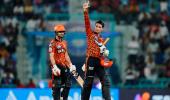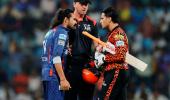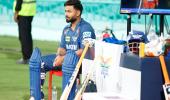The script for Rishabh Pant's IPL 2025 return was meant to be a triumphant one, a powerful narrative of resilience and renewed dominance.
Instead, it reads like a cautionary tale of a Rs 27 crore investment gone awry, culminating in Lucknow Super Giants' playoff exit and leaving their captain's form under a harsh spotlight.
Disappointment on Home Turf

The writing was on the wall at Lucknow's home ground as Sunrisers Hyderabad emphatically dismantled LSG's 205-run target with six wickets to spare.
Abhishek Sharma's explosive 20-ball 59, a whirlwind of power hitting, complemented by composed innings from Heinrich Klaasen and Kamindu Mendis, overshadowed commendable half-centuries from LSG's Mitchell Marsh and Aiden Markram, effectively sealing Lucknow's fate.
But it was Rishabh Pant's brief, unconvincing stint at the crease that starkly epitomised his season-long struggle.
In a desperate attempt to reignite his form, LSG promoted their captain to the crucial No. 3 position -- a tactical gamble that backfired spectacularly.
Walking in after a spectacular 115-run opening partnership had laid a solid foundation, Pant appeared uncharacteristically hesitant and uncomfortable. His 7-run cameo ended with a tame return catch to Eshan Malinga, the Sri Lankan pacer plucking a stunning one-handed grab diving to his left.

The frustration was palpable, none more so than for the franchise owner. Sanjiv Goenka's hasty exit from the Lucknow stadium balcony, his disappointment etched across his face after Pant's cheap dismissal, served as a stark and symbolic representation of LSG's entire season.
For the heavily invested owner and the Rs 27 crore captain, this moment underscored how Pant's underwhelming form had become a significant impediment to their playoff ambitions.
A Season Defined by Tactical Uncertainty

The cold, hard numbers paint a grim picture of Pant's campaign: A mere 135 runs from 12 matches, averaging a paltry 12.27, with a pedestrian strike rate of 100. These figures stand in stark contrast to the reputation of a player once feared by bowling attacks worldwide, the fearless innovator who redefined aggressive batting now appearing tentative and burdened by the weight of expectation.
Perhaps most concerning has been the constant shuffling of his batting position -- a clear indicator of tactical uncertainty that plagued the LSG management throughout the season.
From the eyebrow-raising demotion to No. 7 against Delhi Capitals (marking the first time since his 2016 debut that he batted outside the top six) to Monday's promotion to No. 3 against SRH, Pant has been deployed as a cricketer without a clearly defined role.
The decision to send him in at No. 7 against DC, with Abdul Samad, David Miller, and Ayush Badoni all preceding him, raised serious questions about the team's strategy and their faith in their captain's ability to influence the game.
Pant's subsequent arrival with just two balls remaining, only to be dismissed attempting a desperate reverse scoop, perfectly encapsulated the tactical confusion that seemed to undermine LSG's campaign at crucial junctures.
Discord in the Dugout?

Adding to the on-field woes, reports from multiple sources have highlighted a significant breakdown in the relationship between Head Coach Justin Langer and Team Mentor Zaheer Khan.
This fractured leadership environment reportedly created a visibly strained atmosphere within the team, undoubtedly impacting overall performance.
The two key decision-makers reportedly maintained minimal communication during matches, with strategic timeout dynamics revealing a concerning pattern where Zaheer seemingly called the shots while Langer remained notably absent from discussions.
Former India cricketer Mohammad Kaif, in a candid conversation with Crictoday, highlighted the strained dynamic between Zaheer and Langer, saying, 'Zaheer and Langer don't talk and sit together. They spoke to players differently. I know when you are a new group, it takes time to gel, but surprisingly, they don't get involved despite being a part of the core group.'
Further reports indicated disagreements regarding the suitability of the Lucknow pitches for the team's playing style, adding another layer of complexity to the internal friction.
The team communication structure also appeared compromised, with Zaheer primarily communicating with Pant while largely bypassing other players, seemingly diminishing Langer's role to mere encouraging gestures rather than substantive tactical input during critical moments of matches.
Nicholas Pooran's Inconsistent Form

This season showcased a stark contrast in Nicholas Pooran's form for Lucknow Super Giants. Acquired for a significant Rs 21 crore (Rs 210 million), the West Indian batsman began the tournament explosively, smashing 30 sixes in the initial matches and quickly becoming LSG's primary offensive weapon.
Despite a later dip in performance, Pooran remains their highest run-scorer with 455 runs across 12 innings, maintaining a strong average of 41.36 and an impressive strike rate of 197.82.
Following his powerful start, his batting saw a noticeable decline as LSG approached the playoff contention deadline. After his initial dominance, Pooran's scores dwindled to 11 against the Rajasthan Royals and 9 against the Delhi Capitals.
A brief return to form with 27 versus the Mumbai Indians was followed by another low score of 6 against the Punjab Kings.
Monday's innings against SRH saw a return of his aggressive style, scoring 45 runs off just 26 deliveries and helping LSG reach a competitive total. Yet, this effort ultimately wasn't enough against Hyderabad's strong batting lineup.
Pooran himself has acknowledged his underwhelming performances in the latter part of the tournament, expressing his personal disappointment and desire to rediscover his earlier consistency.
Injury Woes

What makes Lucknow's downfall particularly striking is the confluence of these issues with a significant spate of injuries that plagued their bowling attack from the outset. The prolonged absence of key bowlers like Mohsin Khan, the express pace of Mayank Yadav and the inconsistent availability of Avesh Khan left their bowling unit vulnerable and lacking the firepower needed to consistently defend totals.
Pant himself acknowledged these significant challenges post-elimination, stating: 'We had a lot of gaps going into the tournament. We decided not to talk about it, but it became difficult to close them out.'
Yet, as captain and the marquee signing, the expectation was for him to provide leadership and inspire the team through these crises -- a responsibility that, with his own batting struggles, he ultimately failed to fully fulfill.
The Uncertain Road Ahead for Pant and LSG
Now that LSG's playoff hopes are extinguished, the spotlight will inevitably turn to the future. In his first full season after recovering from a life-threatening accident and subsequent rehabilitation, Pant has been unable to repay the immense faith placed in him.
There is, of course, a natural empathy for his remarkable journey back to professional cricket. His mere presence on the field is, in itself, an inspiring story.
But the IPL is an unforgiving platform -- and sentiment, while appreciated, rarely survives prolonged poor performance.
The crucial questions now revolve around the future leadership of LSG and their continued faith in Pant as captain.
Will the franchise back him long term, or will significant changes be made at the top, both in terms of captaincy and team management?
Most importantly, can Rishabh Pant rediscover the explosive and match-winning batting brilliance that once defined his game and made him one of the most exciting talents in world cricket?











